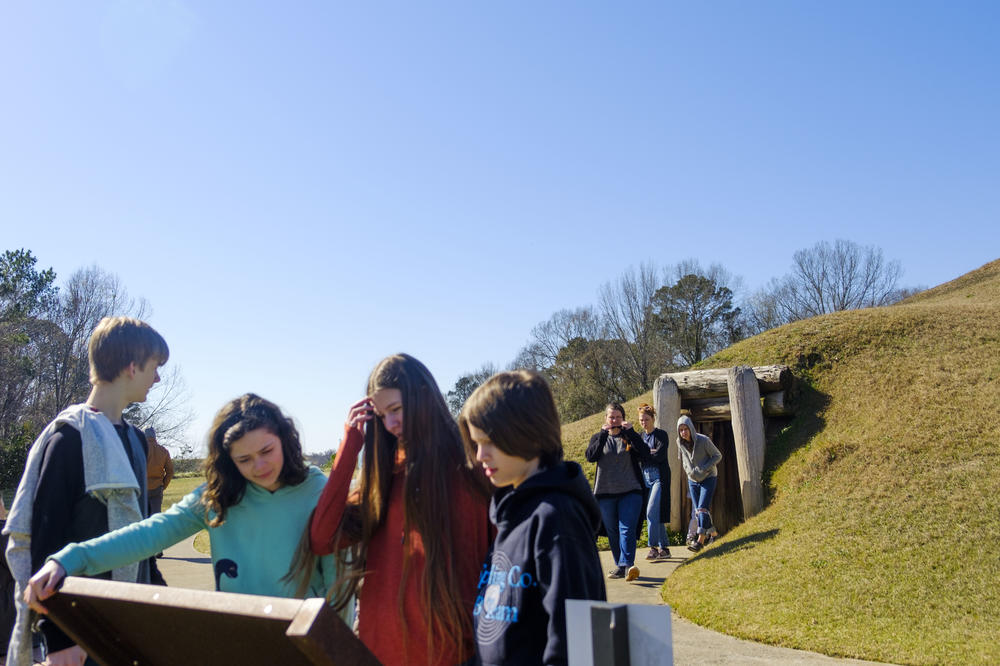
Section Branding
Header Content
New director of outreach in Georgia's national park effort brings a Native voice to the table
Primary Content
Tracie Revis’ roots run thousands of years deep at the Ocmulgee Mounds, but she doesn’t have to look nearly that far back to see the connection.
“That’s my Aunt Addie,” Revis said on a recent trip through a museum at the mounds.
Revis pointed toward a wall full of color photos tucked away in a corner of the museum. Unlike a lot of the otherwise ancient history in the museum, these photos are recent. For Revis, these are family photos, made at the annual festival hosted at Ocmulgee.
“That’s Yuchi elders who have all passed away,” Revis said as she scanned the wall. “That’s my Uncle Lester. Linda Littlebear, her brother just passed away. But yeah, all people from home.”
"Home" is the Muscogee Nation of Oklahoma. Revis is Muscogee and Yuchi. And now the attorney is taking an important role in the effort to expand the footprint of the Ocmulgee Mounds National Historic Park into the first ever full-fledged national park in Georgia.
Revis’ new job is a natural outgrowth of her old one: Before moving to Macon to take the job as director of outreach for the Ocmulgee National Park and Preserve Initiative, Revis served as the chief executive to Muscogee Principal Chief David Hill.
“And so one of Chief Hill's main goals is that we need to get back to the Southeast and make sure we protect and preserve what was ours,” she said.
Home for Revis is also this place on the east side of Macon. For evidence, Revis points to an obvious, if 900-mile-long, cultural throughline.
“So this is Ocmulgee Mounds," she said. "Our headquarters is in Okmulgee, Oklahoma, right?”
Though the city built around the mounds may have seen its peak some 800 years earlier, Muscogee people were still living near the mounds in the early days of the United States in the 19th century. The name would travel west not long after.
“Ocmulgee to Okmulgee,” Revis said.
Any visitor to the Ocmulgee Mounds is likely to first see and enter the structure called the Earth Lodge, a building that’s about 1,000 years old and the only one of its kind. There’s an enormous bird effigy in the clay floor surrounded by a ring of spaces where people sat and, Revis and others say, where people held council.
“When we got into Oklahoma, our tribal council — our national council — is in a mound building, right?” Revis said.
Architecturally, the Muscogee council building is a 21st-century rendition of this ancient space.

The Ocmulgee Mounds are one of a number of Indigenous cities around the South and Midwest with massive ceremonial earthworks at their hearts. They are mostly trapezoids, or pyramids with the tips lopped off. These cities thrived in the 600 to 700 years before Europeans arrived in North America.
Many sites of similar age and cultural importance in the Southwest are national parks. None of the mound cities are.
Revis said she has always felt connected to these cities, even if she didn’t know exactly how. That puzzled her, even as a child.
“You know that you're from there, but you don't understand all the politics and everything that happened as to why you're no longer there,” she said.
The “why” is the 19th-century period of theft of native land by the U.S. government called Removal.
Tracie Revis said she and others still grapple with the fallout of that theft and the near-genocide of the march to the West that followed.
“And I remember being younger, being in high school and fighting for this identity and fighting and having this anger of not really knowing where we fit in in the world,” she said.
In stark contrast to those experiences, Revis said, was the feeling of visiting Ocmulgee with Muscogee Chief Hill.
“I was the first female chief of staff. And when we went up to the Great Temple mound, which is where leadership would have lived, it was a very surreal moment for me,” she said.
That’s why Revis sees two parts to her job as the new director of outreach for the national park effort. Part one is setting the record straight: The Muscogee never left this place willingly.
“We've been gone for 200 years,” she said. "We're coming back to it."
Part two is helping other Muscogee citizens who may still be wrestling with history find some peace back in their ancestral homeland.
“Being able to be back here and coming back and setting something right? It kind of calms that anger,” Revis said. “There's a healing there that comes back from it.”
The effort to add some 60,000 acres of wild river bottom to the mound site and create the Ocmulgee National Park has bipartisan support in the U.S. Congress, although the effort is at a standstill for now.
Meanwhile, Revis is settling into her apartment a few miles from the Ocmulgee Mounds, and looking forward to being the voice of the Muscogee Nation in the future of the land it says it never gave away.


